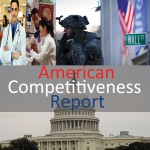There are times when the best policy solution should be the easiest to achieve, but remains stubbornly out of reach. Nowhere is this more evident than in the challenges with improving American competitiveness.
 As Norman Augustine, the retired chairman and chief executive officer of Lockheed Martin and American Security Project board member, sees it, “in many cases we know what needs to be done, it just takes leadership and it takes courage to do difficult things.”
As Norman Augustine, the retired chairman and chief executive officer of Lockheed Martin and American Security Project board member, sees it, “in many cases we know what needs to be done, it just takes leadership and it takes courage to do difficult things.”
Augustine, who has held numerous senior leadership positions in a variety of organizations, including as chairman of the American Red Cross, the Defense Science Board and the Aerospace Industries Association, said in an interview “many of the issues that relate to competitiveness have long-term payoffs. They don’t have payoffs tomorrow morning.”
Education and investment in research are such areas, he pointed out, where the current short-term mindset is hurting the country. A particular area of concern to him is that many U.S. states have decided to “disinvest in education.”
“We as a nation are becoming less and less competitive and this has enormous consequences for our standing in the world, for our standard of living, for our national security,” he said.
The political tension around near-term needs and long-term improvements to American competitiveness will be on full display in the coming days as the White House rolls out its fiscal 2014 budget. A lot of attention will be on the Defense Department’s budget request. Yet the measure of national power, and competitiveness, in the 21st Century is much broader than any one Pentagon funding account.
“It all comes back to having a strong economy. To me, that’s what competitiveness is about,” he said. “Candidly, we’re on a path to being a second-rate nation sooner than we would like to think.”
Big policy changes are needed. Measurable and meaningful progress, however, will continue to be elusive until attitudes and expectations begin to change. This means having the fortitude to step back from the tit-for-tat approach to policy in Washington. Instead, leaders need to think strategically about the country’s national security, and the array of decisions that can either make our country weaker or make it stronger. Doing so will put improvements to American competitiveness well within reach.
Listen to the full interview with Augustine, click below.
Check out ASP’s White Paper on American Competitiveness that discusses these issues further:
Read our Blogs and Listen to our other podcasts in the series:
Podcasts:
Interview – Debt ceiling again looms large for states, city government
American Competitiveness – Interview with former Gov. Christine Todd Whitman
Adm. William Fallon (Ret.) on sequestration and American Competitiveness
Sequestration – what’s happening in the States
American Competitiveness and National Security – Podcast
Blog Posts:
The STEM Jobs Shortfall Is a National Security Shortcoming We Can Fix
Immigration, American Competitiveness and National Security
Making the case for U.S. leadership in the Pacific
Pentagon – Rare Metals Shortfalls is a National Security Challenge
More Fiscal Focus From The Chairman Of The Joint Chiefs
America’s Long-Term Test: Fusion Power
Moment near for a ‘grand bargain’ on the debt?
Veteran Unemployment and American Competitiveness
Living with uncertainty in the defense industry
Harvard Business School survey finds more pessimism about U.S. competitiveness
Competitiveness – Education: What most schools don’t teach
Sequestration – damage to American competitiveness
Energy R&D Critical to American Competitiveness



